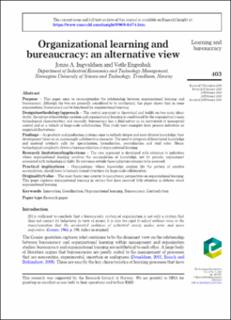| dc.contributor.author | Ingvaldsen, Jonas A | |
| dc.contributor.author | Engesbak, Vetle | |
| dc.date.accessioned | 2021-03-12T12:38:45Z | |
| dc.date.available | 2021-03-12T12:38:45Z | |
| dc.date.created | 2020-06-23T13:29:11Z | |
| dc.date.issued | 2020 | |
| dc.identifier.citation | Learning Organization. 2020, 27 (5), 403-415. | en_US |
| dc.identifier.issn | 0969-6474 | |
| dc.identifier.uri | https://hdl.handle.net/11250/2733173 | |
| dc.description.abstract | Purpose – This paper aims to reconceptualize the relationship between organizational learning and bureaucracy. Although the two are generally considered to be antithetical, this paper shows that, in some organizations, bureaucracy can be functional for organizational learning. Design/methodology/approach – The central argument is theoretical and builds on two main ideas: firstly, the nature of knowledge creation and organizational learning is conditioned by the organization’s main technological characteristics; and secondly, bureaucracy has a dual nature as an instrument of managerial control and as a vehicle of large-scale collaboration. This study uses examples from process industries as empirical illustrations. Findings – As products and production systems come to embody deeper and more diverse knowledge, their development takes on an increasingly collaborative character. The need to integrate differentiated knowledge and material artefacts calls for specialization, formalization, centralization and staff roles. Hence, technological complexity drives a bureaucratization of organizational learning. Research limitations/implications – The core argument is developed with reference to industries where organizational learning involves the accumulation of knowledge, not its periodic replacement associated with technological shifts. Its relevance outside these industries remains to be assessed. Practical implications – Organizations, whose knowledge creation fits the pattern of creative accumulation, should learn to harness formal structures for large-scale collaboration. Originality/value – The main thesis runs counter to mainstream perspectives on organizational learning. This paper explores organizational learning in sectors that have received little attention in debates about organizational learning. | en_US |
| dc.language.iso | eng | en_US |
| dc.publisher | Emerald | en_US |
| dc.rights | Navngivelse-Ikkekommersiell 4.0 Internasjonal | * |
| dc.rights.uri | http://creativecommons.org/licenses/by-nc/4.0/deed.no | * |
| dc.title | Organizational learning and bureaucracy: an alternative view | en_US |
| dc.type | Peer reviewed | en_US |
| dc.type | Journal article | en_US |
| dc.description.version | publishedVersion | en_US |
| dc.source.pagenumber | 403-415 | en_US |
| dc.source.volume | 27 | en_US |
| dc.source.journal | Learning Organization | en_US |
| dc.source.issue | 5 | en_US |
| dc.identifier.doi | 10.1108/TLO-11-2019-0168 | |
| dc.identifier.cristin | 1816783 | |
| dc.relation.project | Norges forskningsråd: 237900 | en_US |
| dc.description.localcode | The manuscript is deposited under the Creative Commons Attribution Non-commercial International Licence 4.0 (CC BY-NC 4.0) | en_US |
| cristin.ispublished | true | |
| cristin.fulltext | postprint | |
| cristin.qualitycode | 1 | |

